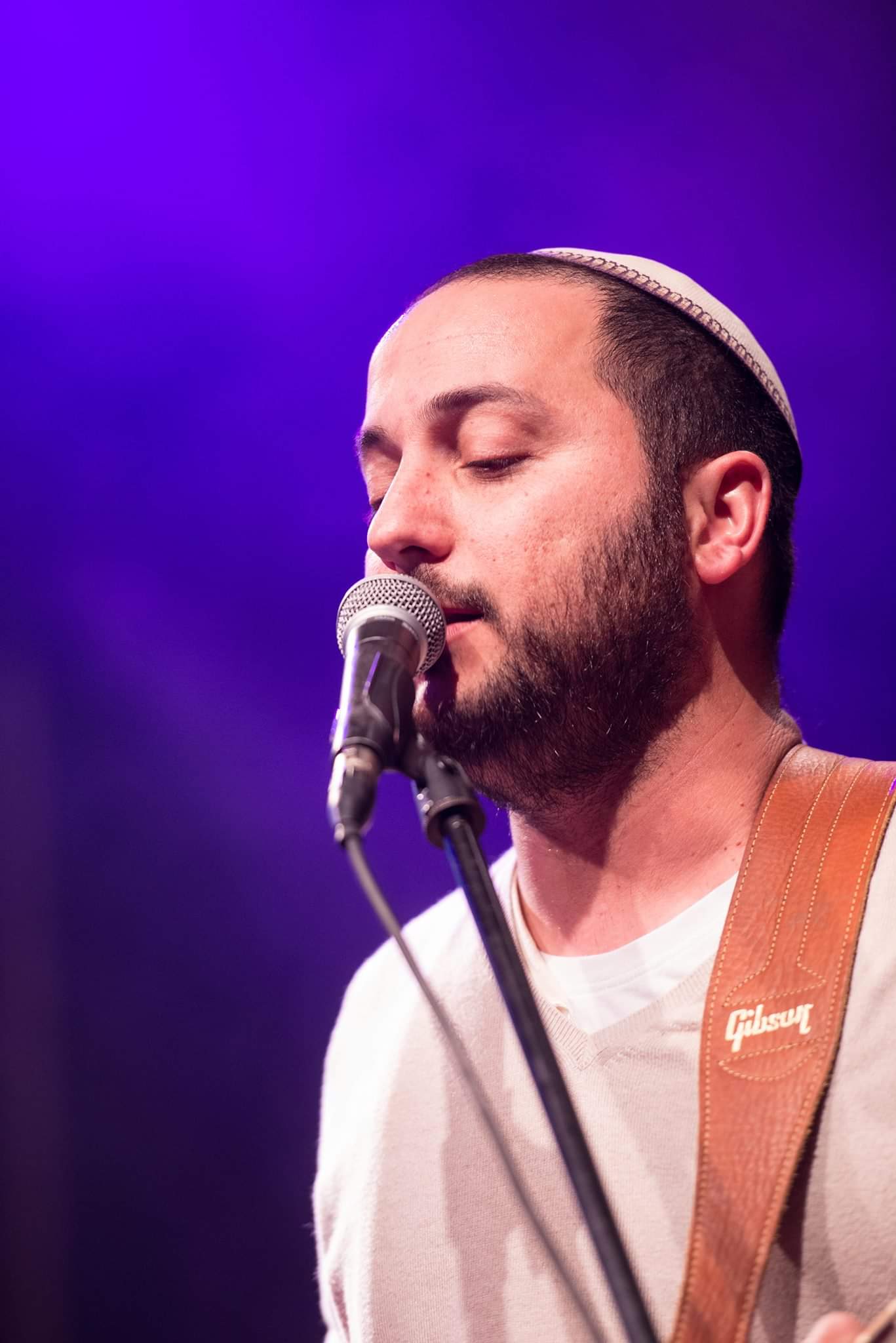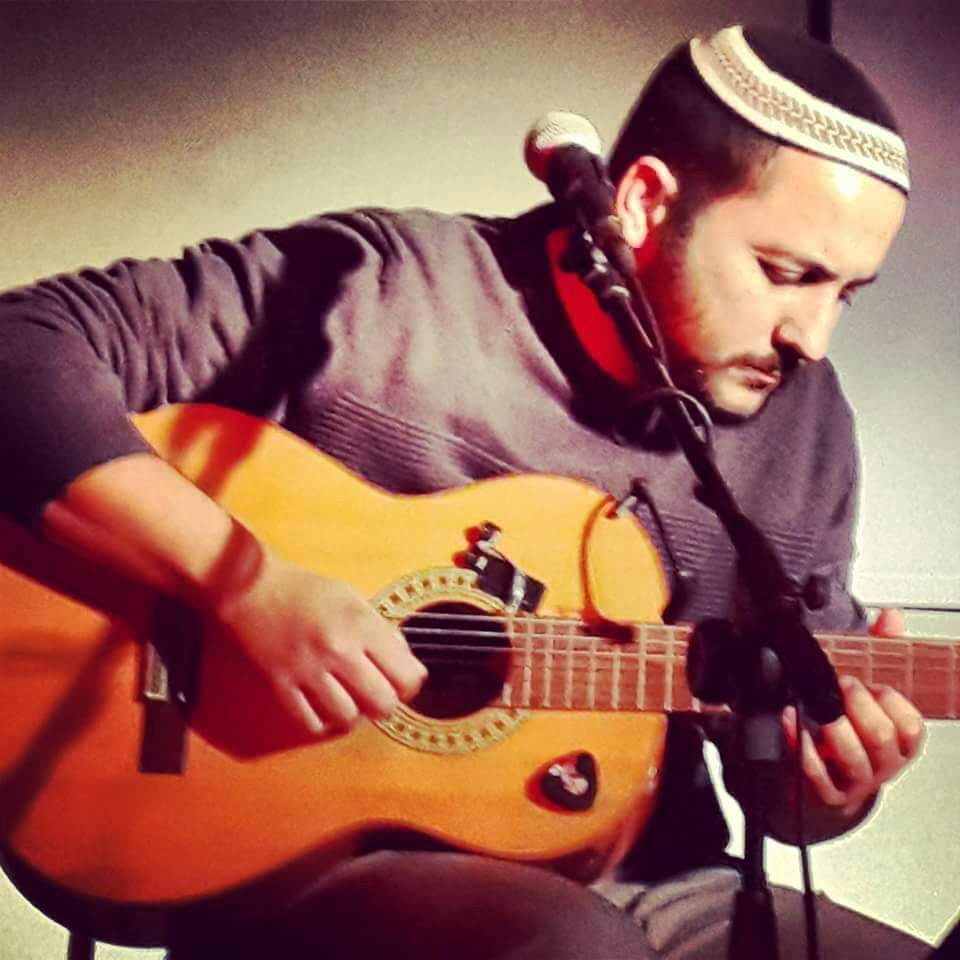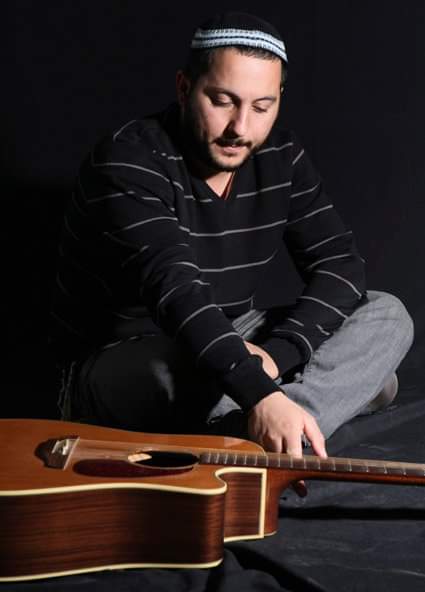Avi Benayoun: "I Don't Want to Get There Fast, I Want to Get There for Real"
Three years after announcing a retirement from music creation, Avi Benayoun releases a new song that encapsulates the main lessons he's learned, transforming his life forever.
 Avi Benayoun (Photos: Anat Levy and Yossi Bar)
Avi Benayoun (Photos: Anat Levy and Yossi Bar)Ten years ago, Avi Benayoun, a talented creator and always "the brother of," faced a severe crisis that changed his life dramatically. This crisis, known until now to only a few, reveals the roots of the significant changes that have taken place in his turbulent life. "At that time, I was married and a father to one child," shares Benayoun, "I was considering additional sources of income and decided to open a musical instrument store.
"I am not a great businessman, and today I know I'm not particularly successful. I took savings, rented a place, and opened the store – it was a dream come true for me. Very quickly, I realized I made a wrong investment. I'm a musician, not a shrewd businessman, and within five months of the opening, I understood I was losing grip, and it was heading in a bad direction.
"From there, things deteriorated further, and after a short period, I sold our home to close the debts. It was a very, very difficult time. In the end, it turned out that selling the house didn't cover all the debts, and some were left even after that. This shook our lives and, of course, also affected my creative work. Only recently, in sober hindsight, I can see how much good came from all of this, and why Hashem directed the events this way."
Then Amir Joined the Search
Avi Benayoun, almost unbelievable, released his first album: "Won't Give Up" 15 years ago, and since then, he has been considered by many as one of the most intriguing voices in the evolving Jewish music genre. Benayoun, married and a father of three living in his hometown of Be'er Sheva, announced his retirement from music three years ago and is now primarily involved in education.
Benayoun, who teaches sacred subjects in the high school yeshiva in Yeruham, and is active in the "Wings of Spirit" project for empowering youth there, grew up in a traditional home that didn’t fully observe Shabbat, but later made a significant journey toward embracing Judaism completely.
"All my life I was involved in music," Benayoun recounts. "At age six, I picked up the guitar Amir received as a gift. Amir taught me to play my first song, I understood the logic, and it continued from there. Beyond that, my father also engaged in music, and, of course, Amir was always in the background and was very successful, which also directed me towards the musical field.
"I grew up in Be'er Sheva, in a typical simple Moroccan household, and I always remember very warm people around me. Our house wasn't religious, but there was a lot of tradition, including *kiddush*, holidays, etc. I came to significantly observing a life of Torah and mitzvot later on my own.
"I remember that in high school, I had many questions. I always asked myself what the purpose of life is, what I am doing here, and such things. In the secular world, there aren't many answers to these questions. I'd wake up, eat, study, hang out, sleep, wake up again, but there was no meaning. When I was in the army, I started exploring the matter more seriously, but still didn’t do much about it. I only occasionally put on *tefillin*.
"After a certain period, I decided to start observing Shabbat, without really knowing what I was doing. It just felt right. After that, I searched for a place to study Torah, and Amir joined the search. We quickly found a synagogue near home, and started praying there and attending classes.
"My first album was written in the seam between these worlds, and one can hear the beginning of strengthening there. In the albums that followed, the spiritual discourse is, of course, much more present. During that period, I also had the privilege of founding a family, and my closeness to Hashem grew stronger. I entered a *kollel* for *ba'alei teshuva* for several good years, and during this time, I continued to create.
"After my fifth album, which was released three years ago and summarized 15 years of creation, I felt I had to decide my direction. In my youth, I completed a degree in special education, and seriously considered going into education. Creating music demanded a lot from me. Both mentally and financially. I felt it was hindering the progress of my family. I always did what I wanted and believed in, but suddenly a bigger consideration came in, which was the well-being of the family I had established.
"Moreover, I felt I needed to clarify for myself the place from which I create. I wanted to be in a purer place. I wanted to feel that this was not my job, that I wasn’t obliged to create, and that I could do what I love when it suits me.
"I had to reach a place of independence to do what I wanted. Truly, not what was expected of me. I felt it was becoming forced. I understood that if I continued, I'd have to do things I believed in less.
"I estimate that I wouldn't have reached places of crossing halachic lines, I hope I'm grounded enough in Torah not to be tempted, but I'm referring to things I'm not built for, like performing at weddings. I'm here to convey messages, and it's hard for me to entertain. I would love to simply entertain, but I need intensive work to reach that place."
The Joy of Small Details
Among the other subjects Benayoun talks about regarding his decision to retire from active involvement in music is creating in the shadow of his older brother Amir, one of Israel’s esteemed creators. "Yes, I feel there's more expectation of me because I'm 'the brother of.' I don't rule out that in my subconscious there's a kind of fatigue from these comparisons, and I took a break from that too.
"Besides, handling many things I thought would gain immense appreciation, but didn’t succeed commercially, was very challenging for me. But it’s not just the commercial success. Many times, I felt I was reaching out to people with all my might, but not succeeding in truly connecting with them. I felt I couldn’t break this barrier.

"Often people come to my songs with preconceived notions, and don't manage to approach with a clean perspective to see them through. In addition, unfortunately, there’s what’s called 'overabundance of music' today, and I don't always embellish things in a commercial way that pleases the ear. I just can’t create from that place. And if you don’t capture someone in the first few seconds of a song, that’s it, the story is over.
"The world has become such that people don’t really listen anymore. They want to be hooked on the first second and don’t listen over and over to grasp the depth. I think it’s very unfortunate because, this way, many important things in life are missed.
"And for this reason, too, I thought I needed a break. I wanted to think about how to reach people nevertheless. These past two years helped me clarify and focus on this matter. In the three years working with youth, I discovered amazing things. I discovered that I truly reach people. I worked with a very small group, and it became clear to me that each one of them is a whole world. The satisfaction was enormous.
"But the more important message I learned from this is another. Western culture has ingrained in us the idea that success is only when it reaches millions, in huge quantities. And when talking about influence, Western culture urges you to influence vast amounts of people, and tells you that a small influence isn’t worthwhile.
"But after the process I’ve undergone in recent years, I understand that even if you touch 12 people in a year, and even if you contributed only a little to them, that's a tremendous thing. From this place, I'm also slowly returning to music. I now feel that even if my music reaches few people and makes them happy, then I'm satisfied, and I've done my part. The Torah of Israel exalts this idea, and says, 'Whoever saves a single life is considered as if he saved an entire world.' As always, I try to follow the words of the holy Torah, and not Western culture.

"Moreover, there’s another major disadvantage in Western culture. Some songs have millions of views, but they haven’t truly touched even one person. And there are songs that reached fifty people but influenced them strongly. And that is far more significant, in my opinion. Additionally, there’s a path in everyone’s life, and the path has meaning even if it’s slow. Therefore, with Hashem’s help, I feel this is my place.
"From this perspective, precisely from this, I intend to publish more songs in the future. I’ve already recorded a few, and with Hashem’s help, we will release them from time to time. And maybe I'll also go out for small performances. A few years ago, I performed at Shemaim Center in Tel Aviv, and in the days before the show, I felt it wasn't comfortable for the venue owners to talk to me. In retrospect, I understood they didn’t want to tell me that very few tickets had been sold.
"In the end, 20 people—maybe 30—came to the performance. I remember telling myself right before the show: 'If you came to feel you’re wow, then this isn’t the place. Maybe it’s better to cancel. But if you came to do something for people—then even for one person, it’s wow.' In that show, I sweated like never before in any other performance in my life, because I really gave it my all.
"And in the end," continues Benayoun, "it all boils down to everything being for the best by Hashem. Often when you're in the midst of hardship, it’s hard to see anything good coming out of it. But Hashem has a purpose and mission for you, and He will take you through what He wants, whether you like it or not.
"If ten years ago someone had told me I would go through what I went through and survive it, I simply wouldn't have believed I could do it. But today, I understand that if Hashem puts a person through a specific test, it signifies they can withstand it. Thanks to this, I gained tools that help me see the world differently and make me more patient.

"Today, as I said, I see how everything Hashem put me through was entirely for my benefit. After all the mess with the debts, I returned to work at my father's construction company. Then a few slipped discs in my back happened, and I was told I couldn’t continue working there. The debts were large, and I wanted badly to close them, and I didn’t understand why Hashem was hitting me blow after blow. My righteous wife, to her credit, constantly said it’s all for the best from Hashem, and not only that—we would see it with our own eyes.
"Because of the slipped discs, I returned to learning more and also to work in a *kollel* for *ba'alei teshuva* in a social role, and thanks to a few years of Torah learning, and as a result of being free to pursue an education degree at a charedi college, I was offered to work in education, which is what I'm doing today, and so love to do.
"A few months ago, I spoke with my rabbi, and he pointed out to me that all the blows I received brought me to find my purpose in education. He told me, 'See how Hashem wanted you to put music aside, to fill up with Torah, so you would be ready to take on education. And see what important things you’re doing today.' I was very moved to see this. It’s also so clear. And as known, one of the happiest things in the world is to see how Hashem guides your path."

